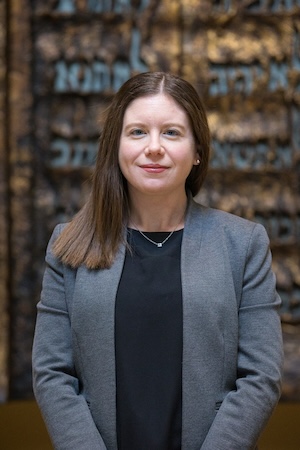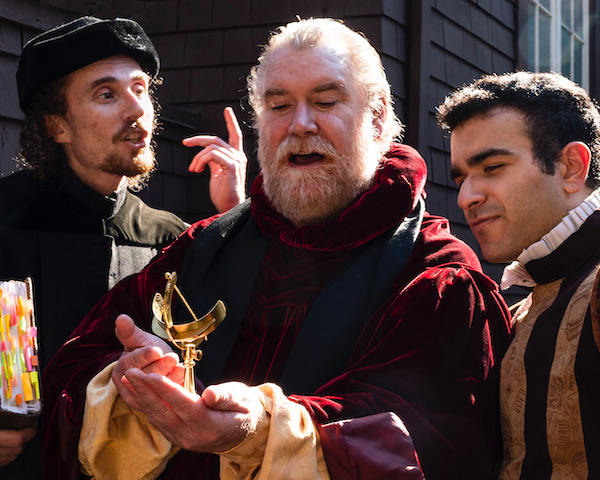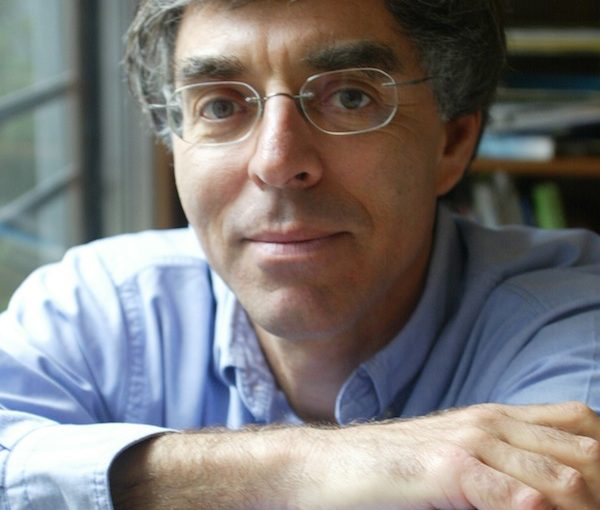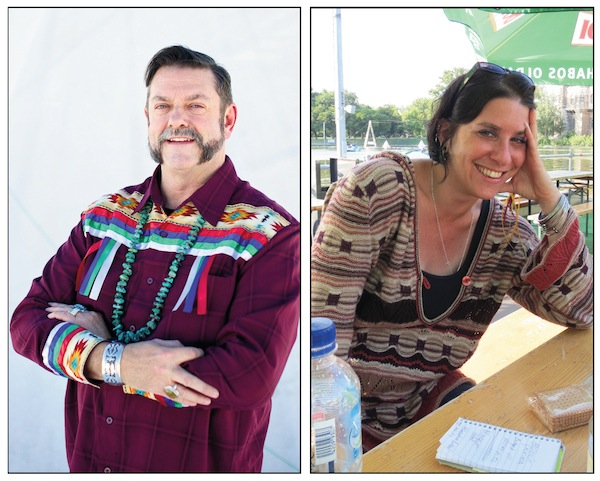Bradley West and Shayna Plaut (photos from conference organizers)
As part of Winnipeg Pride Week in May, local organizers put on the first-ever Queer and Faithful Conference.
A grassroots event created to give voice to LGBTQ2+ people of colour and their experiences with faith and spirituality, the conference featured two panel discussions with opportunity for informal roundtable discussions. The keynote speaker at the May 25-26 conference at Robert A. Steen Community Centre was writer, facilitator and performer Jenna Tenn Yuk. She spoke about exploring identity and the intersections of race, queerness and faith through personal storytelling, spoken word poetry and facilitation; encouraging interfaith conversations around intersectionality, privilege, social location and other aspects; creating safer spaces for LGBTQ2+ people of colour in faith-based environments; and ensuring safe spaces to ask questions and explore the issues as a community.
Bradley West, who has been involved with Winnipeg’s queer community for more than 20 years, and Shayna Plaut, a former Vancouverite who now lives in Winnipeg, were part of the conference’s Jewish panel.
“I think the conference came about because there were people who had been talking about the importance of keeping their faith, while also celebrating their gender and sexual diversity, and there were some people who were finding that to be a little difficult,” West told the Independent.
Explaining that it was an uncomfortable topic for many people in the broader queer community, he said, “In fact, one of the members said, on Saturday, that, ‘because faith rejected us so soundly, we have rejected faith.’ We need to create a safe space where we can come together and have these conversations – where people from the various faith communities and also from the queer community can come together in a mutual space.”
While such conversations have been going on for some time, typically led by faith leaders and queer community organizers, the aim of the recent conference was to offer a more personal approach.
“The organizers wanted to have voices of the people who are more marginalized in our community, because of their skin tone, or religion, or spirituality, or faith,” said West. “They wanted to make sure it wasn’t just centred around white voices; white, Christian voices….. Oftentimes, when we are having conversations about faith in this Canadian landscape, we default to the dominant voice which, in our historical context, is Christian.
“So, they definitely had a lot of Christians who were there and who were involved, but, in terms of the planning and the panel speakers, and in terms of how they wanted people to think, was thinking of how we might be able to create an open dialogue with each other … to be able to, first, honour our own faith journey, but then also to understand the faith journey of others, especially when that faith journey is very different from our own.”
According to conference organizers, 70 to 80 people attended over the two-day period, with attendees coming from Winnipeg, as well as from surrounding areas, such as Morden, Selkirk, Steinbach and Portage La Prairie.
“From what I experienced, everyone … was approaching it with a spirit of reflection,” said West. “They were definitely gently challenged by the speakers to reflect on their own personal participation in terms of do you really believe your faith is the only faith or the true faith … and does that subtly reinforce this idea that those who are different are ‘less than’?”
The speakers, he continued, “were gently challenging people to think about how we interact – not only with the different denominations in our faith, but everyone of Abrahamic faiths, with different strings of denominations, and also those outside of some of the faiths … different groups practising different versions of the larger faith. Sometimes, we have a tendency to think that our journey and our view is the view that is shared by everyone in our faith … and so, there were those gentle reminders to reflect on that. Overall, as a participant, I would say there was a sense of a call to self-reflection, and there wasn’t any resistance in terms of the intent to self-reflect, for sure.”
For West, one thing that struck a chord was that, even though he was in a room full of strangers at the beginning of the event, everyone got to know one another very quickly. “I think it was very much about, yes, we have differences, but we also have commonalities and, as we move forward, we need to look at both … have a bifocal lens in honouring our differences – not minimizing or whitewashing, or asking us to abandon our differences in order to get along … just focusing on our similarities. We’re going to honour that and work together, and look at how we’ll create spaces and places within our own lives. And then maybe, by extension, our own communities will allow more of these dialogues.
“The gathering had the flavour of us coming together and having these conversations, and continuing to do so outside of this space,” he said. “That core that comes from great changers, like [Mahatma] Gandhi, talking about that idea of, if you want to change something, first, change yourself, because, wherever you go, there you are. If you change yourself, you’ll automatically change the spaces you go into, because you are no longer the same person.”
Plaut’s faith has changed over the years. Born into a Chassidic home in the United States, her family decided to follow Conservative Judaism when she was 5.
“The joke I like to say is, I’m queer, I’m Jewish, I’m a mom, I have seven tattoos, 13 earrings, and I keep a modicum of kosher,” said Plaut. “I teach at the University of Winnipeg and work in the field of human rights and journalism.”
When asked to help organize the conference, Plaut jumped at the chance. She took on the role of food coordinator and ensured all the food was vegetarian, so that everyone could eat, regardless of their religious or dietary restrictions. She also took it upon herself to make sure that not only the Abrahamic faiths were represented, but also Hindu or Sikh, by reaching out to some of her students.
“Folks would use their own experiences and explore some of the strengths that they found within their faith and also some of tensions,” said Plaut about the conference. She said that some people feel like they have to choose, in terms of their identities – religious, cultural and sexual – and that the conference encouraged an exploration of various faiths’ strengths and limitations in terms of guiding people, and what it means to find acceptance within a faith.
The conference attracted a range of attendees.
“Many of the folks who came, not all, but a good proportion, may not have identified as being queer themselves,” said Plaut. “Many of them were grandparents, actually, or parents who wanted to know how to better support their children or grandchildren. They wanted to learn.”
While organizers worked hard to share with and connect people, they left it up to the participants whether to exchange their contact information with one another. Some attendees expressed interest in continuing the conversation beyond the conference and organizers are working on determining the next steps. Many of the participants joined the nearly 50,000 marchers at the Winnipeg Pride Parade, which took place June 1.
“It was amazing, our biggest Pride ever in terms of participants in the parade,” said Plaut. “There were over 112 organizations that registered either floats or walking groups.”
Rebeca Kuropatwa is a Winnipeg freelance writer.




